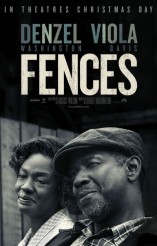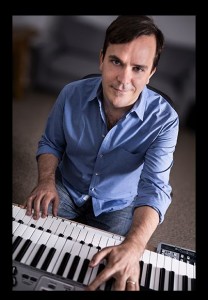
FENCES composer Marcelo Zarvos | ©2016 Marcelo Zarvos
A distinctive, and prolific voice in Hollywood since arriving from his native Brazil, Marcelo Zarvos has created any number of musically explosive dramatic incidents – among them CELL‘s zombie-making phone calls, the murderous bad cop behavior of BROOKLYN’S FINEST and BEASTLY‘s groovily hip take on a fairy tale as old as time. A frequent collaborator with director Barry Levinson from the found footage parasitic horrors of THE BAY to PHIL SPECTOR‘s record producer gone mad, as well as a go-to composer for Showtime series like RAY DONAVAN, THE C WORD and THE AFFAIR. Marcelo Zarvos’ eclectic resume is no busier than when dealing with relationships in all of their humor, passion and pain. Starting out on such indies as TULLY and KISSING JESSICA STEIN, Zarvos has brought comic quirk to such dramedies as PLEASE GIVE, THE BEAVER and FRIENDS WITH KIDS. But it’s in his often gently affecting way with strings, piano and rhythm that Zarvos cuts to the heart of the matter in such moving scores as DOOR IN THE DLOOR, REMEMBER ME and THE WORDS.
Where Zarvos has often dealt with the strains of family ties, perhaps none of his work in that playing field has felt the angry, anguished weight of FENCES, or required as much delicate restraint to express those emotions. While it marks the first studio adaptation of an August Wilson Pulitzer Prize-winning play, FENCES multi-hyphenate Denzel Washington certainly knows the territory of a writer who chronicled America’s working class black experience for the stage like no other, especially having played FENCE‘s volatile family matriarch Troy on Broadway. A baseball star that could have been somebody before ditching his dreams to become a garbage man clawing his way up a dead-end ladder, Troy seethes with anger for everyone in his Pittsburgh orbit. Facing the brunt of his rhapsodizing on life’s brunt realities is his hapless wife Rose (Viola Davis) and son Cory (Jovan Adepo), taking as much emotional, and sometimes physical abuse as they can bear, all while Troy’s battle-scarred, bugle-playing brother Gabriel (Mykelti Wilson) receives what tender mercies can be bestowed by Troy when not draining a government paycheck earned from his head injury.
While filled with impressive, and likely Oscar-nominated performances, the true star of FENCES are August Wilson’s virtually non-stop words, monologues on philandering, fate and misery that are a music all their own. Subsequently, FENCES isn’t a movie that requires non-stop scoring to say the least, let alone music that will rise above its harsh, sometimes screamed utterances. It’s a requirement that brings out Zarvos’ expertise in broken characters at its most impactfully hushed – all the better to contrast the verbal heat for scenes that border on exploding into outright violence. Yet it’s a score that yearns for something better in its soft piano and string melodies, an approach that’s unexpectedly lyrical, given the anger on hand. Troy’s madness at evading “Mr. Death” also comes across in eerie percussion, where not allowing the sadness that permeates the film to plunge into outright musical depression. For when Zarvos’ score does show up, however briefly, his work powerfully opens up August Wilson’s world to the big screen – showing off Zarvos as a musical wordsmith who knows here that nothing is more impactful than keeping his voice at a hushed, poetic whisper.
ASSIGNMENT X: Tell us about what brought you to film scoring?
MARCELO ZARVOS: My first loves were stories and literature. I was an avid reader at a very young age, a real bookworm and it was a very natural transition from written stories to filmed ones, even before I was into music at all. Actually it was the movies that first awakened my interest in music. I remember the score for THE STING in particular pretty much being the catalyst for me wanting to learn to play the piano. All that marvelous ragtime music somehow really captured my imagination and I became obsessed with learning that music and played Scott Joplin’s “The Entertainer” for my first piano recital when I was 9. Film scores from the 70s and 80s were also a big source of inspiration for me. I fell in love of course with all the Spielberg/ Williams stuff. BLADE RUNNER was another big one. I think by the time I was 13 I knew film scoring was what I wanted to pursue and basically bid my time playing in rock bands and studying classical music and jazz until I was ready to go to college.
I attended Berklee College with the intention of studying Film Scoring but felt it was too soon too specialize so much and decided to transfer to CalArts where I immersed myself in World Music, Experimental Jazz and 20th Century Classical music. After graduating from CalArts I moved to NYC and it was not until 10 years after I came to the U.S that I had my first actual scoring experience. Somehow during those 10 years I trusted film would come to me, I kept my ears open, watched A LOT of films and I spent my time performing my work with my group in downtown venues like the Knitting Factory as well as various art galleries and basically any space that would have me. I also recorded three albums for a Japanese label called MA Records that really allowed me to find my voice as a composer. The style was a mix of classical, jazz and world music and I would say it formed the basis of what I do to this day.
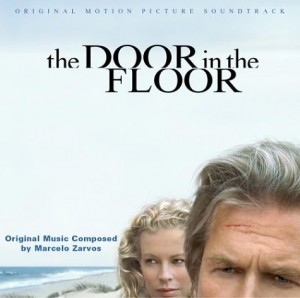
DOOR IN THE FLOOR soundtrack | ©2016 Decca Records
AX: You scored quite a few independent movies like TULLY, KISSING JESSICA STEIN and THE MUDGE BOY before drawing the ear of bigger films like DOOR IN THE FLOOR, BROOKLYN’S FINEST and THE GOOD SHEPHERD. What was that journey like, and how do you think you finally made it to the prolific place you are now?”
ZARVOS: I can pretty much trace everything I’ve done to the very first short film I did which was called A SOCCER STORY and was a real success in the festival circuit – starting with the Brasilia Film Festival where I won an award for Best Score and going all the way to an Academy Award nomination in the Short Film Category. My first feature came via a fellow Brazilian editor, Affonso Goncalves, who was cutting TULLY and had heard my score for A SOCCER STORY and also had watched me perform on Brazilian TV some of my compositions. He suggested that the director Hillary Birmingham should meet me. We really hit it off and that was my entrance into the indie film world that has been a really big part of my career to this day.
From there on it was a pretty steady and gradual progression with MUDGE BOY and KISSING JESSICA STEIN. Somehow I managed to just keep getting these indie jobs at a time when real breakouts were very much possible, like in the case of KISSING JESSICA STEIN. My real “big” break came with DOOR IN THE FLOOR. once again courtesy of editor Affonso Goncalves, who put me in touch with the director Kip WIlliams. That was a big jump for me and also the beginning of a very fruitful collaboration that still continues to this day with all the folks from the former Good Machine film company. James Shamus, Ted Hope, Anthony Bregman and Anne Carey were all responsible for that project and opened more doors for me than I could count. James Shamus who at that time was the head of Focus Features brought me back to work on several of their projects like “Sin Nombre” and also additional music for BROKEBACK MOUNTAIN, THE GOOD SHEPHERD came from Robert De Niro falling in love with my score from “Hollywoodland,” which was also a Focus Features project.
AX: In the times that you’ve seen stage plays, what struck you about how music was used in them?
ZARVOS: Having lived on and off in NY for a long time I’ve had the opportunity to watch many plays. I think in general the music in plays tends to be about transitions. Whether physical, psychological or chronological, music tends to work best in that way as far as I can tell. I did write a few scores for plays but the area that really interested me more was always dance and my scores for modern dance companies like Pilobolus and DanceBrazil were a really important part of my musical development.
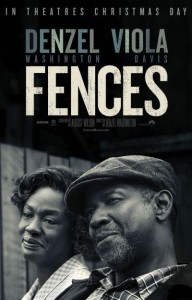
FENCES | ©2016 Paramount Pictures
AX: How were you brought onto FENCES? And were you familiar with August Wilson’s plays before taking the gig? If not, did you dive into them?
ZARVOS: I had read his work in college but can’t say I was that familiar with it. And yes, of course I read FENCES and really tried to imagine what music could do for this incredible piece of drama. My involvement really came the old-fashioned way from me putting a reel together and sending it to the producer Todd Black and Denzel. They really liked the music and asked me to meet with them after screening an early cut. It’s been a real series of pinching myself moments ever since I walked into the cutting room and meet Denzel in person.
AX: Having worked with actor-directors like Robert De Niro for THE GOOD SHEPHERD and Jodie Foster on THE BEAVER, what do you think they bring to the process that a singularly occupied filmmaker might not? How was your collaboration with Denzel unique?
ZARVOS: What these actor/ directors have in common is how they bring their mastery of performance into the director’s chair. With De Niro and Denzel in particular their aversion to anything that smells of over acting very much informs how they would direct me to score their films. Both demanded A LOT of restraint from the scores. One of the unique things about Denzel was that he was also the lead of the film and his performance could not have been more under a microscope. I consider it to be one of the great privileges of my life to have been able to watch him sculpt this incredible performance while remaining very faithful to the words and calmly and methodically do some of the hardest things one can attempt in film. Number one, adapting a successful play and number two creating a screen performance that is equal or better to the many roles we have seen from him, which by all means would be a superhuman effort to begin with when you think of TRAINING DAY, PHILADELPHIA or GLORY. His commitment to the film was 200%. He knew the material inside out having performed it and been awarded a Tony for the FENCES revival in NYC a few years ago. It just was a marvel to watch an amazing actor being directed by an incredible director and they just happen to be the same person.
AX: Did Denzel have any particular philosophy as to how the music needed to work in FENCES? And how did the score evolve through the process?
ZARVOS: He knew there would not be a lot of music and that the score would have to fight its way into the movie and really deliver where it counts. He also was very focused on the idea of “less is more” and forced me to really look at the totality of a scene, including the sound effects and most importantly the words to figure out how music could fit in. When we first met he said the score was the August Wilson text and music was there to enhance and support it. He also set a very high bar to everyone involved in the production. We had to be as good as August and either the work elevated the play or it has no place being there at all.
AX: How do you think your score helped Denzel “open up” the play into a film?
ZARVOS: I think it helps a lot to suggest the passing of time. To give it an epic and cinematic quality. I also think at times it can work as an ultra-focusing device so we pay even more attention to the words. It helps the emotional arc of the film. We don’t have score until the middle of the second reel about 30 minutes into the film. The score becomes increasingly present as we approach the climax of the film in the later reels. In a way one could almost say the score doesn’t peak until the very last scene of the film when as per August Wilson’s words “The sky opens up as wide as God’s closet”. So it really was all about restrain and just giving enough but never an inch more and to make sure music was never leading and always supporting and staying out of the way of the performances.
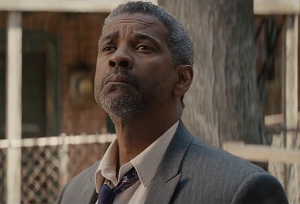
FENCES | ©2016 Paramount Pictures
AX: Your score isn’t “black” in terms of bringing in jazz and ethnic elements. Did you and Denzel want to go for a universally emotional approach as such?
ZARVOS: Denzel had zero interest in having the score be overtly African American in any way. In his own words August Wilson IS the blues and we don’t need any more of it in the score. His vision was that “Fences” is a universal story that transcends all cultures and ethnicities. I happen to agree and when we first met that was one of the first things I told him about my own vision for the score.
AX: How did you and Denzel want to place the score into the film, especially given how impactful nearly all of August Wilson’s dialogue is?
ZARVOS: For me the dialogue in FENCES is really like Shakespeare. You live, breath and die by the words. Denzel always said the score was the text and the music should always be looking to support it as much as possible. Interestingly enough both Denzel and Viola’s voice range were quite low and he became very fond of high violin textures that would hover well above their range and provide a subtle counterpoint to the complexity of the words without getting in the way.
AX: Given how many scenes are on the edge of physical violence, the score is unusually lyrical. Was that a contrast you strove for?
ZARVOS: Yes, very much so. We were not interested in ever mimicking or replicating what was on the screen already. The idea, and this is a big one for me in general, is that you don’t want to “double” anything – especially in the case of FENCES The performances are so layered and nuanced that you are always better off staying out of the way and trying to provide a new dimension that may not be apparent to the naked eye.
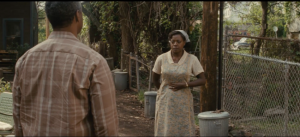
FENCES | ©2016 Paramount Pictures
AX: There’s a real “love” – hate relationship with Troy in the film. How did you want to capture such a conflicted, often abusive character?
ZARVOS: I always try to make things personal on any score I work on. So I really try to draw from my own experiences. We all have one or more Troys in our lives – people who both hurt and inspire us. And I was very much thinking of that as I wrote the music to so many of these scenes that make you cringe. But here is the thing. I believe we, as filmmakers, must love all the characters no matter how flawed they might be and withhold any form of contempt or prejudice. It is up to the audience to decide how they feel about them.
AX: How did you want to play Troy’s increasing, heartbeat-like madness when it came to fighting “Mr. Death?”
ZARVOS: For those scenes the trick was to keep it internal and avoid at all costs giving into any kind of “genre” type sound. The struggle for Troy is a spiritual one and I tried to make the music inform that, but again, not replicate the almost savage elements of the performance in the music. A heartbeat was very much a part of it. Interestingly enough those scenes were the only places in the score where I used any form of electronics to create this otherworldly heartbeat feel.
AX: How did you want to play the character of Gabriel, especially when it came to his flawed, but heavenly note that ends the film?
ZARVOS: Gabriel is the musical soul of the film. I believe August Wilson certainly thought that by naming Troy’s brother Gabriel, and the fact that he played the trumpet. We first hear the score when he appears and as a matter of fact he hears it before we do. And needless to say the final cue also comes literally out of his trumpet playing. A miracle happens there, and from a strained trumpet note, out comes this heavenly sound that becomes our final cue. I was frankly terrified of writing that cue but we were all very happy with how it came out in the end. After Denzel first heard that cue he said now it was up to Visual Fx to match the transcendent quality of the music. It really does open up the movie and takes us to this miraculous place that Rose, Cory and the family find themselves in.
AX: Is it hard to compose such a restrained score that also has to communicate a tremendous amount of emotion, while dancing around so much dialogue?
ZARVOS: You bet. I’ve done my fair of dialogue heavy dramas but this one is really at a very different level due to both the complexity and musicality of the dialogue and also the immense restraint Denzel wanted from the score. It really was a case of how much musical bang for the buck can you get from beginning to end. As a matter of fact while I was working on FENCES, I made a large sign than hung just below the screen in my studio that said “LESS IS MORE” and often would sit and stare at it for long periods of time while trying to crack the heart and soul of Troy Maxin.
AX: Perhaps the most listened-to project you’ve scored is for Showtime’s RAY DONAVAN, which essentially updated the “Hollywood fixer” you scored for HOLLYWOODLAND to the modern day. What’s your fascination for these industry enforcers, and why do you think that “Ray Donovan” has caught on like it has?
ZARVOS: Ray Donovan, like the detective Louis Simo (Adrien Brody) in HOLLYWOODLAND is a modern day super hero. With all his flaws the one constant is that Ray always delivers in the end, no matter what. I feel the cat and mouse element of the story is the heart of the show’s success. The other element of course is the incredible group of ever evolving, crazy and lovable characters like Mickey Donovan (Jon Voight) whose charm and humor work as such a perfect balance to Ray’s serious and brooding performance. My personal fascination is the whole anti-hero thing and the ability to tap on that dark side of the characters.
AX: You’ve done particularly impressive work for HBO “real life” telefilms like the financial collapse of TOO BIG TO FAIL and the Al Pacino biopics YOU DON’T KNOW JACK and PHIL SPECTOR. What draws you to these often troubling subjects?
ZARVOS: The thing hat attracts me the most to all of these HBO films has always been the excellence in filmmaking. The projects you mentioned were directed by the late Curtis Hanson. Barry Levinson and David Mamet. I mean, these are heroes of mine whose body of work has not only been incredibly influential for me personally but I would say to the entire world of filmmaking. Another fun element in those projects are the HBO folks themselves. Both the head of HBO films Len Amato and music supervisor Evyen Klean are not only immensely talented and filmmaker friendly but also have become good friends over the years. So it really is always a no brainer when one of those projects come up.
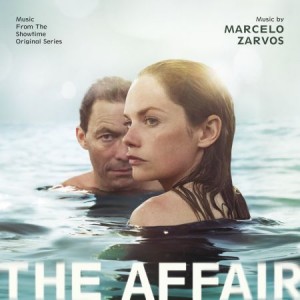
THE AFFAIR soundtrack | ©2016 Varese Sarabande Records
AX: Two other impactful Showtime series you’ve scored have been for THE BIG C and THE AFFAIR. What have those experiences been like?
ZARVOS: THE BIG C was my first foray into episodic television and was quite a steep learning curve. But we really had a blast creating that unique blend of humor and pain in equal measures. As for THE AFFAIR, all I can say is the show has been like a creative paradise for me. Show runner Sarah Treem has from the beginning given me so much freedom and trust to do what I feel is right. She’s created a situation that is the antithesis of the “too many cooks” syndrome that can affect so many TV shows. I consider THE AFFAIR to be as true an expression of my artistic soul as anything I have ever done and probably will ever do.
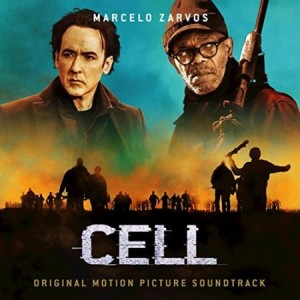
CELL soundtrack | ©2016 BFD Records
AX: Your score for the Stephen King adaptation CELL, which finally came out this year, is particularly creepy in capturing the killer signal of technology. Tell us about how you created that particularly unnerving sound?
ZARVOS: Everything started with “The Pulse” in that one. At first we wanted to score everything electronically but it became clear the music needed to emphasize more the savagery of the “phoners” who had been infected and in the end the score is very much a blend of electronics and late 20th century extended orchestral techniques. One of the challenges was how to navigate a very thick soundscape that was created by sound design team. In the end I was very happy with the result and felt it was very much a stretch out of my comfort zone.
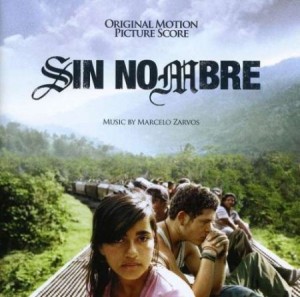
SIN NOMBRE soundtrack | ©2016 Lakeshore Records
AX: Would you like to do more scores that draw on your Latin heritage like SIN NOMBRE, especially given the rising prejudice towards immigrants, and foreign citizens the world over?
ZARVOS: Oh yes. I would really love to do that. I have also have a fruitful, ongoing collaboration with Brazilian director Bruno Barreto on LAST STOP 174 and REACHING FOR THE MOON. Having the opportunity to incorporate the sound of my native land into my work is always both a blast and a tremendous privilege.
AX: Why do you think you have a particular talent for intimate dramas like FENCES, REMEMBER ME and THE WORDS?
ZARVOS: I believe it goes back to my love of words and literature. These projects all have one element in common which is a real devotion to the spoken word. They’ve taught me how to write around complex dialogue and be expressive and nuanced. A lot of the times when I write for films like DOOR IN THE FLOOR. I will literally turn off the video and just write to the rhythm of the words, letting the text itself be the clock and guide to the music at all times.
AX: What do you think that FENCES will show Hollywood in terms of its play adaptations?
ZARVOS: I think there have been amazing play adaptations. Mike Nichols alone did so many iconic ones. I do think it’s always a challenge as the medium is so close to film to begin with, as opposed to a book adaptation for instance, but in the hands of a passionate director, whether he or she may come from theater or not, plays will always be a rich source of material. I just feel so lucky to be a part of such a special one.
AX: Given that the score for FENCES is relatively short in the film, do you think the music is more impactful for its restraint, or would you have wanted more of it? On that note, do you think there’s something to be said for shorter-running scores when many movies seem to have too much music?
ZARVOS: I think FENCES has exactly the amount of music it needs. At first I kept trying to find ways to add more but as it’s often the case the more I saw the movie through the eyes of the director the more I realized the music had to be incredibly subtle and just the right amount. Remember, there is NO music in the play so whatever we ended up with is already a big addition to a play that frankly needs very little to begin with. And yes, I do believe less music does tend to value the importance of the score more. That is not to say there should be a “one size fits all” approach to spotting films. As a matter of fact I feel as composers out job is to always find the perfect balance. Not more and not less than what is needed for any particular film. As Barry Levinson would say to me, if you listen carefully the movie will spit out all the music it does not want or need.
FENCES is now in theaters. Listen Marcelo Zarvos’ score, available on Sony Classical Records January 6th, HERE
Have a tryst with Marcelo Zarvos’ AFFAIR HERE, investigate Hollywood sin with RAY DONAVAN HERE and make a killer CELL call HERE
Visit Marcelo Zarvos’ website HERE
Follow us on Twitter at ASSIGNMENT X
Like us on Facebook at ASSIGNMENT X
Article Source: Assignment X
Article: Interview with FENCES composer Marcelo Zarvos
Related Posts:




